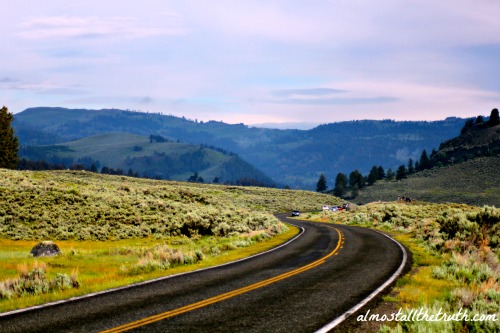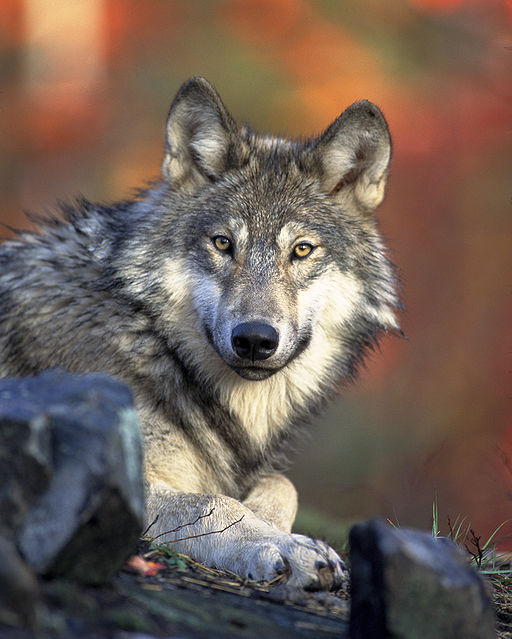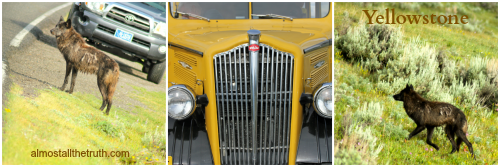Wolves in Yellowstone National Park
I wake to the sound of crickets courtesy of my phone’s alarm at 4 am. It was pitch black when I loaded three sleepy children in the car wearing the clothes I dressed them in to sleep. I had a little foresight to make the early morning a little easier. We were spending our first morning in Yellowstone National Park in search of the wildlife it is so famous for, both elusive and abundant.
We saw bears, pronghorn, bison galore, mountain goats, elk, but perhaps most special of all we were fortunate enough to catch a glimpse of a controversial ghost.
There is no middle ground when it comes to wolves. They must be the most controversial animal in existence today. Whether you love them, fear them, or wish they were all put in zoos, if you live in the west you have an opinion. The high emotions and politics of wolf reintroduction, lethal removal, and rancher’s rights rival that of any presidential election.You might never have guessed any of that when passing a group of people with spotting scopes, binoculars, and palpable excitement when there was word two female wolves were traveling just off the road in Lamar Valley. We decided to turn the historic yellow tour bus around to see if we could catch a glimpse of something, anything, and the black female wolf crossed the road right in front of us.
It was summer, a time of growth. Her coat not the luxurious black we might have expected from wildlife photography, but breathtaking all the same. I had my long lens with me, furiously shooting as I hang out of the window. I know I might never have this chance again. This is the first and only wolf sighting for our tour driver.
Wow.
While camping at the Buffalo Bill State Park, we went through the museum in Cody, WY. In one section, there was a place to fill out the answer to a seemingly simple question, “Do wolves belong in the West?” If you know the current state of wolves in this region you can guess what many of those answers might have looked like. I asked my own children who know next to nothing about the recent history what their response would be, as they raced off to see the next part of the exhibit. These children follow my heart and mine dropped as I stopped to fill out a card.
The majority included black-and-white sentiments like, “Kill all wolves,” or “Wolves are vermin.”
What I would have liked to say wouldn’t fit on the tiny card and wouldn’t have likely made any kind of difference even if it had been posted. In this, most adult minds are already made up.
Facts on Wolves in the West
- Wolves are keystone predators, meaning they are an essential component of their ecosystem. They have an important role in maintaining balance.
- Wolves were here long before humans and would have been here all along if not for human intervention designed to drive them to extinction.
- Wolves do kill livestock, however, it is not nearly as many as some would like you to believe. Wolves account for the least number of deaths by predators. Interestingly some livestock losses occur on public land, national forest land, where predators live.
- Wolves do kill game species. Typically it is the most vulnerable of the species (sick, old) and this natural process keeps herds healthier and stronger.
- Ranchers and wolves can coexist, but we will need a shift in perspective for the benefit of all.
Wolves, or any predator, must believe there is a greater risk of killing livestock than their wild prey. Animals will always choose the path of least resistance. This is why we should not feed the bears and practice leave no trace practices while camping and spending time in the wilderness. This is why we often need to change our behavior for the benefit of the entire ecosystem.
See more photos from the ‘Wake Up To Wildlife’ tour on Facebook.
Do you agree? Do wolves belong in the West?




Really i fear of wolves,but it’s an very interesting story of the wildlife, which i enjoy too. So, thanks for your nice post.
I believe that they DO belong in the west. I understand the rancher’s concerns … each animal they raise equals money … it’s their livelihood. But from everything I’ve read, wolves are not the threat to their livestock that we are lead to believe … they don’t kill to simply kill but to eat. When they killed all the wolves in Yellowstone, they were left with problems which they couldn’t fix. So they re-introduced the wolves. And now ranchers complain. We humans have short memories. My opinion is that ranchers need to learn to co-exist with wolves and all wildlife. Perhaps that means that they keep their livestock out of public lands … or if they choose to graze them on public lands, then they accept that there might be losses. But to kill wolves is arrogant and short-sighted. Our actions must be more than the “bottom dollar”. I am not and have never been a farmer or rancher so I will admit that I don’t understand their point of view.
I agree with you. I do understand that ranchers have gotten used to raising their animals on public lands with little recourse, but two facts remain: (1) Wolves are not generally a threat to livestock when properly cared for (i.e. some ranchers will have to make changes) and (2) Wolves are a key part of the ecosystem and when a keystone predator is wiped out, there are more problems than benefits. Wild animals belong in the wild and wolves belong in the Western wilds.
Fascinating and I do agree with you. Wolves are a key part of the ecosystem. Incidentally there’s a great PBS documentary called Dogs Decoded that looks at how dogs evolved from wolves. It’s on YouTube.
Pingback: Protect Wild African Lions | A green living, green parenting blog